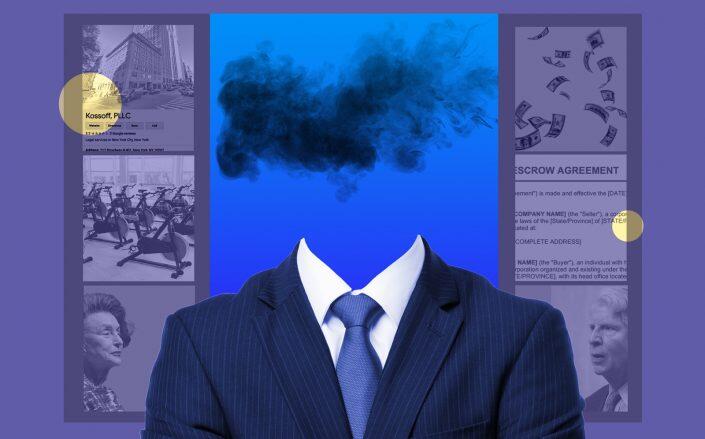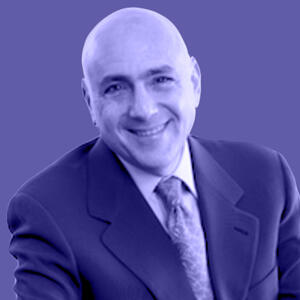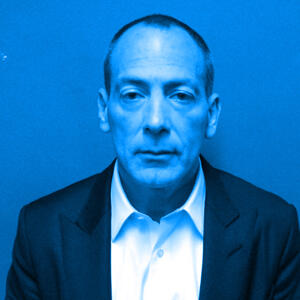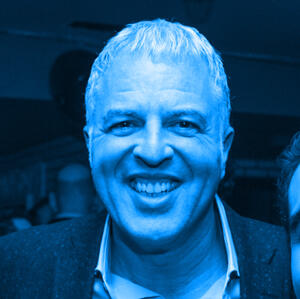
(Illustration by Paul Dilakian/Getty)
The spin class at the New York Sports Club near City Hall was a popular lunchtime workout for landlords and real estate attorneys.
They would go for the intense instructor, Mitch Kossoff, a spinning evangelist and one of New York City’s most prominent landlord lawyers.

Mitch Kossoff
In the studio, Kossoff cranked up a soundtrack of thumping club music, motivating his class to “dance on the bike” as they worked up a sweat. In his law practice, too, Kossoff made adversaries perspire with an encyclopedic knowledge of the state’s byzantine rent stabilization and loft laws.
But clients haven’t seen the hard-driving, fast-pedaling lawyer lately, either at the office or on the bike. And some are afraid there’s another thing they won’t ever see again: their money.
In early April, Kossoff vanished, leaving millions of clients’ dollars in escrow funds unaccounted for. The scandal has rocked real estate professionals across the city, many of whom put their own money into someone else’s bank account with the expectation — based entirely on judge of character — that it would remain safe.
He’s not a fugitive.
“Lawyer escrow is supposed to be sacrosanct,” said Neil Shapiro, a real estate partner at law firm Herrick Feinstein.
Kossoff, who has yet to reappear publicly, represented some of New York City’s biggest multifamily owners, including major rent-regulated landlords such as Steve Croman of 9300 Realty, Terrence Lowenberg and Todd Cohen’s Icon Realty Management, and Larry Gluck’s Stellar Management.
In his absence, his law practice has practically dissolved, leaving his attorneys scrambling to find new jobs. Clients have turned to the courts to recoup their funds as well as documents that remain locked up in the firm’s Lower Manhattan office. Even Kossoff’s own mother took legal action, claiming her son forged her signature to take out a series of emergency business loans.
So far, nearly $10 million in escrow funds are alleged to be missing, while the federal court in Manhattan oversees the bankruptcy of the abandoned law practice and Manhattan District Attorney Cyrus Vance investigates possible criminal actions.
Criminal defense attorney Walter Mack of Doar Rieck Kaley & Mack said he has been retained by Kossoff to represent him in any criminal cases. Mack said that since the scandal erupted, he’s spoken with his client frequently and that Kossoff hasn’t run off, despite the fears of some clients.
“He’s subjected himself to the jurisdiction of the Manhattan district attorney and the U.S. attorney,” Mack said. “He’s not a fugitive.”
Some attorneys roll over easily, but he was an aggressive lawyer.
That still leaves a host of unanswered questions: Where is Kossoff? What did he do with the missing millions? And what would prompt a respected, veteran attorney to simply throw it all away?
‘He’s scary’
The law firm of Kossoff PLLC is headquartered at 217 Broadway, not far from the New York State Homes & Community Renewal office where landlords go to make changes to a rent-regulated apartment.
That was his turf.
If there were an error in the paperwork 10 years back that allowed a building owner to raise the rent on a stabilized apartment, for example, Kossoff would not only find it but also convince regulators that the owner had a legitimate case. If a client wanted to buy a building and the seller’s lease riders weren’t in order, Kossoff would spot it and give the buyer leverage to seek a lower price.
And the attorney is known for playing rough.
“He’s scary,” said one landlord who was on the other side of a deal from Kossoff and spoke on the condition of anonymity. “He’s one of these guys who knows the law inside and out and will hang you up.”
Not surprisingly, some of Kossoff’s clients liked that tough-guy approach.

Steve Croman
The list includes some of the biggest rent-regulated landlords in the city. They’re no strangers to controversy — Croman and Icon’s principals have been accused of harassing their regulated tenants in order to raise rents. It’s not clear if Kossoff’s highest-profile clients had escrow accounts with him, and they are staying tight-lipped.
Stellar declined to comment and Icon Realty did not respond to a call for comment. An attorney for Croman said the situation is “very concerning” but declined to comment further.
In addition to being one of the most knowledgeable landlord attorneys, Kossoff is also known as a dogged litigator.
“Some attorneys roll over easily, but he was an aggressive lawyer,” David Rozenholc, himself a fearsome tenant attorney in New York, said with a kind of professional reverence. “He would litigate and would push cases. He was not easy to settle with.”
Kossoff’s reach wasn’t limited to his law practice. He ran a side business called Tenant Tracers, where an investigator would keep tabs on residents to find out, for example, if a rent-regulated tenant was really using an apartment as a primary residence, as required.
But a big part of his business was negotiating tenant buyouts, and that’s where the escrow comes in: Kossoff would get his landlord clients to put money for tenant buyouts into his such accounts to prove that they were serious about getting a deal done.
And he was a big factor for many landlords who successfully deregulated apartments.
“He certainly used his escrow account as a sword,” said one attorney familiar with Kossoff’s deal-making. “There’s nothing like holding a check to someone’s throat to make them more amenable.”
Incommunicado
It’s difficult to say exactly when things started to unravel at the law firm, but clients who regularly communicated with Kossoff say he grew elusive around late winter.
SSM Realty Group, a Long Island-based landlord with at least three large rental properties in Manhattan, made a request in February for Kossoff to return $1.5 million of the $2 million in escrow he had been holding for the company since last year.
By March, Kossoff had only returned $700,000, according to a lawsuit SSM filed in April. That’s when things went downhill.
“Mitchell became increasingly difficult to track down, failed to return the remainder of the escrow funds and ultimately stopped communicating,” SSM attorneys wrote in a complaint filed April 7.
Another client, Gatsby Enterprises, said Kossoff went radio silent with $525,000 in escrow the company had set aside for tenant buyouts. The landlord, which had worked with Kossoff going back 15 years, sent him $300,000 last year to negotiate three tenant buyouts at an apartment building in Soho, according to a court filing.
As recently as March, Kossoff told Gatsby the company needed to up its offer by $75,000 for each tenant. The landlord then wired its lawyer $225,000 on March 24.
On April 6, Gatsby’s general counsel went to Kossoff’s office and was told by attorneys there that Kossoff’s wife had sent text messages saying her husband had been “hospitalized,” court records show. Kossoff hasn’t been heard from publicly since.
Gatsby’s counsel was also told that Kossoff had exclusive control over the escrow funds and may have transferred them for nonclient purposes, according to Gatsby’s legal filings. It was impossible to tell exactly what happened, though, because banking passwords for the escrow accounts had been reset and Kossoff appears to be the only one with access.
“No one at the firm knew for sure what had happened to Mr. Kossoff or where he was,” Gatsby’s attorneys wrote.
The mounting legal claims against Kossoff and his firm illustrate the kind of money at stake.

Albert Laboz
Albert Laboz’s United American Land filed paperwork saying Kossoff was holding more than $3 million in escrow for the landlord. That includes $2.4 million United American deposited in July 2019 to show a court the company had funds available to demolish a building in Tribeca and pay stipends to tenants. The remaining $800,000 was for tenant buyouts at a loft building on Union Square West.
United American is one of four clients that claim they are missing $8 million in escrow — not counting the $1.85 million SSM and Gatsby want returned — and have filed to force Kossoff’s law practice into bankruptcy.
Signs of distress
It remains unclear what happened with Kossoff’s escrow funds, but there are signs of distress pointing back to last year.
As early as last summer, Kossoff started taking out a series of merchant cash advances — a kind of payday loan for companies where they agree to trade future income for upfront cash.
Between June and January, Kossoff took out at least $3.4 million in these loans, court records show, and agreed to pay back $4.8 million. When he defaulted on the funding agreement, it revealed just how desperate he had been for cash.
Alongside Kossoff’s signature, the funding agreements included a signature purported to be that of his mother, Phyllis Kossoff, a 94-year old philanthropist who founded the New York chapter of the Cystic Fibrosis Foundation.
But the family matriarch said in court papers that she never signed the documents and had been “the victim of a terrible fraud.”
Phyllis Kossoff didn’t directly accuse her son on the record of forging her signature, but her attorneys were more blunt.
“As incredible as it sounds, the evidence demonstrates that the fraud was committed by Ms. Kossoff’s son, Mitchell Kossoff, who concealed what he had done until late last week when he told his mother that there are ‘some documents,’ which had her signature ‘but which she had not signed,’” her attorneys wrote.
According to people who know him, Kossoff stands out from the staid, buttoned-up attorney crowd.
He certainly used his escrow account as a sword.
For client meetings, he eschewed suits in favor of casual pants and a sweater. Some described him as a flamboyant and charismatic character. One person who dealt with him said the dressed-down approach gave the impression of someone who felt he didn’t have to conform to others’ rules.
But by all appearances, Kossoff was a well-regarded lawyer with a long history of fighting for his clients. Without exception, everyone who spoke to The Real Deal for this story expressed shock at the allegations.
Company man
The scandal also caught his co-workers off guard. Kossoff PLLC employed about 30 attorneys, at least one of whom has been named as a co-defendant in a lawsuit.
Caren Decter, an attorney at Frankfurt Kurnit Klein & Selz, is representing eight former Kossoff employees. As soon as Kossoff’s employees discovered their boss had vanished and client money was missing, they all took steps “to report the incidents to the appropriate authorities,” Decter said.
Kossoff clients all declined to comment for this story and tensed up at the mention of escrow accounts.
Landlords across New York City regularly hand over large sums of money in the form of escrow to their attorneys.
But lawyers have walked off with escrow money frequently enough that it’s become something of urban lore — and a cause for concern. When the sum set aside for a purchase gets large enough — say, $10 million or more — many buyers will choose to go with a big title insurance company that offers more security.
In many large law firms, as a way of protecting against corruption, it takes signatures from two or more partners to release escrow funds. But in a single-practitioner firm it’s usually just one lawyer overseeing the funds.
“Most people would not want to leave [large amounts of] money with any law firm, and certainly not any small law firm,” Herrick’s Shapiro said.
Reckoning awaits
As of mid-May, Kossoff had not resurfaced, and no explanation has been given about his absence, people involved in the matter told The Real Deal.
His law practice has crumbled and Kossoff hasn’t responded to the civil lawsuits filed against him and his firm.
One client, SSM Realty, is pleading with the court to grant access to Kossoff’s Downtown office so executives can collect some 25 bankers boxes containing more than 40 years’ worth of business records the law firm is holding.
If Kossoff doesn’t show up, a Manhattan bankruptcy judge is expected to appoint a receiver to liquidate his law practice — which might provide some answers about the escrow accounts.
In the meantime, the scandal has shaken New York’s real estate community. And it’s not just those who are missing money or who have done business with Kossoff who are on edge.
The idea that millions of dollars sitting in bank accounts could disappear has many anxiously checking their escrow funds more frequently.
Anyone, they realize, could be a crook.
“There are bad lawyers, just as there are people with drinking problems and gambling problems and drug addiction,” Shapiro said. “The only difference is, they don’t have this pot of money sitting there.”
